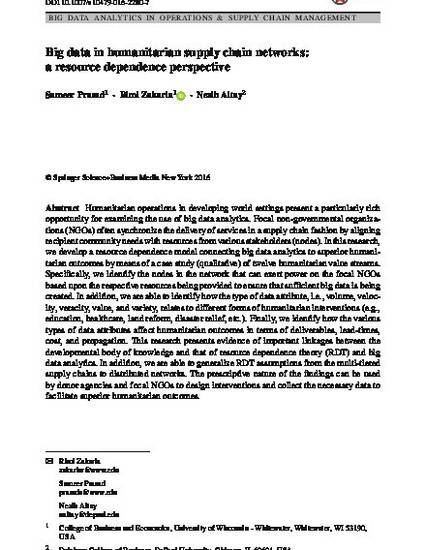
Article
Big data in humanitarian supply chain networks: a resource dependence perspective
Annals of Operations Research
(2018)
Abstract
Humanitarian operations in developing world settings present a particularly rich
opportunity for examining the use of big data analytics. Focal non-governmental organizations
(NGOs) often synchronize the delivery of services in a supply chain fashion by aligning
recipient community needs with resources from various stakeholders (nodes). In this research,
we develop a resource dependence model connecting big data analytics to superior humanitarian
outcomes by means of a case study (qualitative) of twelve humanitarian value streams.
Specifically, we identify the nodes in the network that can exert power on the focal NGOs
based upon the respective resources being provided to ensure that sufficient big data is being
created. In addition, we are able to identify how the type of data attribute, i.e., volume, velocity,
veracity, value, and variety, relates to different forms of humanitarian interventions (e.g.,
education, healthcare, land reform, disaster relief, etc.). Finally, we identify how the various
types of data attributes affect humanitarian outcomes in terms of deliverables, lead-times,
cost, and propagation. This research presents evidence of important linkages between the
developmental body of knowledge and that of resource dependence theory (RDT) and big
data analytics. In addition, we are able to generalize RDT assumptions from the multi-tiered
supply chains to distributed networks. The prescriptive nature of the findings can be used
by donor agencies and focal NGOs to design interventions and collect the necessary data to
facilitate superior humanitarian outcomes.
Disciplines
Publication Date
2018
DOI
10.1007/s10479-016-2280-7
Citation Information
Sameer Prasad, Rimi Zakaria and Nezih Altay. "Big data in humanitarian supply chain networks: a resource dependence perspective" Annals of Operations Research Vol. 270 Iss. 1-2 (2018) p. 383 - 413 Available at: http://works.bepress.com/nezih_altay/29/
